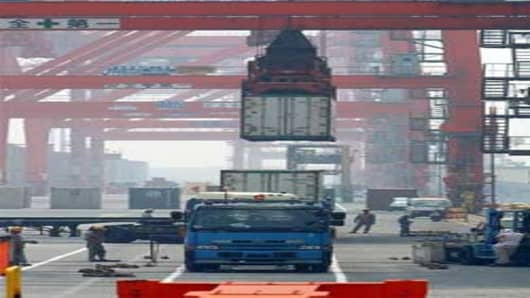Japan's exports rose more than expected in January from a year earlier as solid shipments to Asia and Europe cushioned soft exports to the United States, a major destination for Japanese goods.
But the trade balance notched its biggest deficit in two years as higher crude oil and natural gas prices drove import bills up, data from the Ministry of Finance showed.
Financial markets showed a muted reaction to the data as it did little to alter speculation that the Bank of Japan's next move could be to cut rates in the face of a deepening credit crisis.
The trade deficit of 79.3 billion yen ($734 million) contrasted with economists' median forecast for a surplus of 35 billion yen. The trade gap was the biggest since a deficit of 394.4 billion yen registered in January 2006 and followed two consecutive months of year-on-year falls in the surplus.
"Although Japan's exports were underpinned by shipments to Europe and Asia, the slowdown in U.S.-bound exports will gradually affect overall Japanese shipments abroad," said Tatsushi Shikano, senior economist at Mitsubishi UFJ Securities.
"That could force the BOJ to revise down its assessment on the economy further following a downward revision in December. We still expect it to cut rates by April and then in June."
Overall exports rose 7.7 percent in January from a year earlier, as robust shipments of cars and steel to Asia and European-bound exports of ships and motors offset sluggish demand from the United States.
Exports to the United States fell fell 3.2 percent, the fifth straight month of decline, due in part to a fall in construction machinery which was probably related to the U.S. housing slump, a ministry official said.
Exports to the European Union rose 10.6 percent, after two months of slower growth.
Shipments to China, now the No. 1 buyer of Japanese goods, rose 4.6 percent in January.
Economists have warned that exports, the key driver of Japan's economic recovery, could lose steam in the first half of this year as fallout from the U.S. subprime mortgage market debacle spreads to the global economy.
Some economists have said the economy may shrink in January-March in the face of slowing output, which is largely dependent on overseas demand.
But others were less pessimistic.
"Economic conditions in Japan may not get better soon," said Seiji Adachi, senior economist at Deutsche Securities.
"But I don't expect the economy to shrink or enter a recession, by which I mean the economy contracting for two quarters in a row."
Japan's all-industries index, which covers a broad range of economic activity including the tertiary sector index of service industry activity, fell 0.2 percent in December, separate government data showed on Thursday.
At least for the last quarter of 2007, Japan was able to enjoy robust economic growth thanks largely to firm exports and capital spending.
Japan's gross domestic product, the world's second largest, grew at an annual rate of 3.7 percent in October-December, far above the meagre 0.6 percent logged in the United States in the same period.
The BOJ left interest rates on hold at 0.5 percent as expected at the latest policy board meeting held last week, and central bank Governor Toshihiko Fukui, who retires in March, expressed a more cautious view about a slowing global economy.


